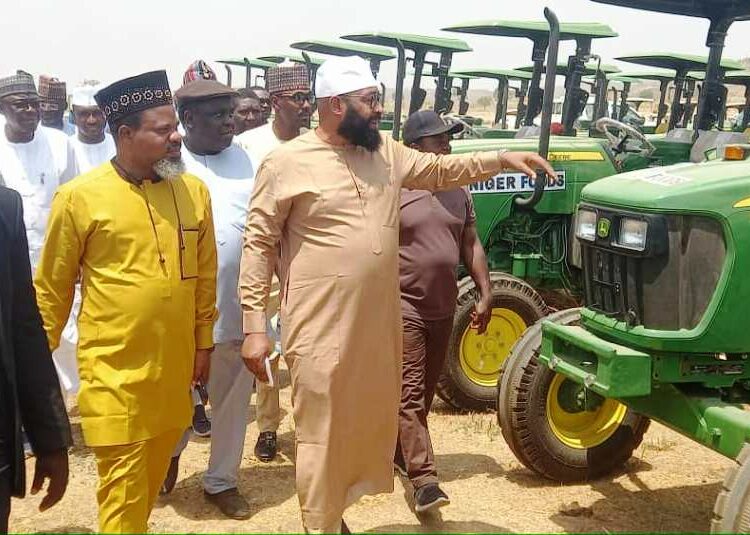Niger State, Nigeria’s largest state by landmass, is a region blessed with immense natural and agricultural resources. With over 76,000 square kilometres of land, of which 85 percent is arable, and favourable climatic conditions, it has long held the potential to become the nation’s agricultural powerhouse. Recognising this, Governor Mohammed Umaru Bago, fondly known as the “Farmer Governor,” has embarked on an ambitious agricultural revolution transforming the state’s economy and society.
By harnessing the state’s agricultural potential, Governor Bago’s administration is ensuring food security, creating jobs, stimulating economic growth, and paving the way for sustainable development. Early estimates indicate that these efforts could add over N200 billion annually to the state’s Gross Domestic Product (GDP) and create one million jobs within five years.
Upon assuming office, Governor Bago outlined a clear vision: to leverage Niger State’s agricultural comparative advantage for the benefit of its people and the nation at large. Central to this vision was the creation of Niger Food Security Systems and Logistics Limited (Niger Foods Limited), a state-owned private enterprise established to facilitate agricultural investments, transition farmers from subsistence to mechanised farming, and drive the state’s ambitious “Feed the Nation” agenda.
This enterprise is a cornerstone for modernising agriculture in the state, providing a structured platform to attract local and foreign investments while ensuring farming practices align with global standards. By aligning its initiatives with the federal government’s National Food Policy, Niger State has positioned itself as an indispensable player in Nigeria’s food security strategy, striving to fulfil the dual goal of feeding its people and contributing to the nation’s agricultural exports.
Within a year of assuming office, Governor Bago’s administration has made significant strides, laying the foundation for a comprehensive agricultural transformation. A strategic partnership with global agricultural machinery giant John Deere has enabled the acquisition of advanced farming equipment, including 200 tractors, 50 planters, 30 power tillers, and solar-powered irrigation systems. What sets this apart is the innovative payment system that allows the state to pay for these tools in farm produce, ensuring financial sustainability and highlighting the administration’s commitment to maximising value from its agricultural output.
Additionally, commissioning a Special Agro-Processing Zone at the Bola Ahmed Tinubu International Airport in Minna marks a significant leap forward. This facility, capable of processing thousands of tonnes of crops annually, promotes value addition by processing raw agricultural materials locally, thereby reducing post-harvest losses, creating jobs, and enhancing the overall profitability of the agricultural sector.
The state has developed thousands of hectares of farmland into mechanised farm estates to expand agricultural production. These estates focus on cultivating high-demand crops such as rice, maize, soybeans, and sesame. For instance, over 10,000 hectares have been allocated for rice production alone, potentially yielding over 40,000 metric tonnes annually. Designed to integrate modern farming practices, these estates are equipped with essential social amenities to ensure the comfort and productivity of workers.
At the same time, peasant farmers are not left behind; they are supported with agricultural inputs, training, and access to mechanised tools to integrate seamlessly into this system. Recognising the importance of workers’ well-being, the administration, in partnership with the Niger State Contributory Healthcare Agency (NiCare), launched an affordable health insurance scheme tailored for farm workers. This scheme covers 350,000 households and ensures that agricultural workers have access to quality healthcare services, a critical factor in boosting both productivity and morale within the agricultural workforce.
The administration has also taken decisive steps to ensure equitable access to resources and opportunities across the state. Fertilisers, herbicides, improved seedlings, and farming tools have been distributed across the state’s three senatorial districts. These efforts are complemented by financial empowerment initiatives that have seen over 5,000 farmers receive grants of N100,000 each, along with advanced farming tools and technology such as Point of Sales (PoS) machines and smartphones to enhance their productivity and profitability.
Women, often overlooked in agricultural discussions, have been a priority for the administration’s targeted initiatives. Over 10,000 women have been trained and empowered to play active roles in the agricultural value chain. An additional N1 billion has been allocated to enable more women to benefit from the “Nigeria for Women” project. In collaboration with the All Farmers Association of Nigeria (AFAN), the state has further supported farmers with agricultural inputs worth N30 billion for dry season farming. These measures aim to boost food production, enhance productivity, and foster sustainable partnerships, demonstrating the administration’s commitment to gender equality in agriculture.
The administration recognises that community support is crucial for the success of its policies. Extensive sensitisation campaigns have been conducted to secure public buy-in. These campaigns have been instrumental in recovering grazing lands and reserves, which are now redirected toward agricultural production, underscoring the importance of community involvement in the agricultural revolution.
The state hosting its first Green Summit brought together over 1,000 stakeholders to discuss sustainable agricultural practices, setting the stage for future collaborations and innovations. Additionally, partnerships with local and international investors have expanded the scope of agricultural activities beyond crop production to include livestock farming, aquaculture, and other specialised agricultural ventures. For instance, the ongoing discussions with foreign investors aim to establish a state-of-the-art aquaculture facility producing 5,000 tonnes of fish annually. These initiatives reflect the administration’s holistic approach to maximising the state’s agricultural potential.
–Dr Ukachukwu, a public affairs and communication expert, wrote from Lagos
One of the administration’s most notable achievements is the “Produce-for-Lagos” initiative, a groundbreaking agreement between Niger State and Lagos State. Under this arrangement, Niger State supplies food items such as rice, grains, and legumes to Lagos’ massive Food Logistics Hub in Epe, ensuring a steady market for its farmers while strengthening inter-state collaboration. This partnership not only enhances food security in Lagos but also provides a reliable revenue stream for Niger State’s farmers, further incentivising agricultural production.
The administration’s ability to attract foreign investors has added another dimension to its agricultural revolution. Plans are underway to explore livestock farming, aquaculture, and other specialised ventures. These partnerships underline the administration’s commitment to diversifying its agricultural portfolio and boosting the state’s economic prospects.
Clear and measurable goals drive Governor Bago’s agricultural policies. These include cultivating all available arable land in Niger State, achieving food self-sufficiency, positioning the state as a net exporter of agricultural produce, creating one million jobs over five years with a focus on empowering women and youth, and stimulating the state’s GDP through agriculture-driven economic growth.
The administration also seeks to ensure sustainable rural development and prosperity for its citizens. These objectives are not merely aspirational but grounded in actionable plans and measurable progress. For instance, with 142,623 farmers enrolled in the Federal Government’s Agro Pocket Initiative, the state is on track to achieve significant milestones in dry season farming.
In just one year, Governor Mohammed Umaru Bago’s administration has laid a solid foundation for an agricultural revolution in Niger State. By prioritising mechanisation, fostering strategic partnerships, and empowering farmers, the administration has boosted the state’s economy and created opportunities for sustainable development and prosperity.
As Niger State continues its journey to becoming Nigeria’s agricultural hub, the progress achieved so far is a testament to the vision, determination, and innovative spirit of the “Farmer Governor.” With continued commitment and innovation, the desired transformation is not only within reach but also promises a brighter, more prosperous future for Niger State and its people.





